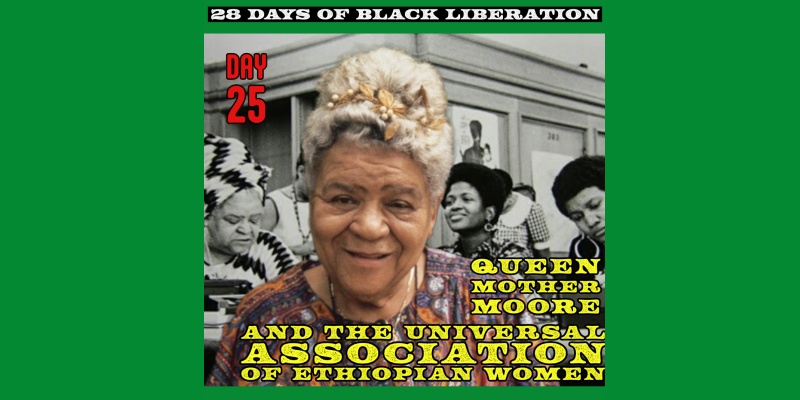Day 25 of the 28 Days of Black Liberation 2023
The Universal Association of Ethiopian Women (UAEW) was a grassroots Black nationalist and Pan-Africanist organization active in Louisiana from 1957 to 1963. While Audley Moore is often given credit for starting the organization, the UAEW was founded and supported by multiple women including Eloise Moore, Mother Langley, Dara Abubakari, Alma Dawson, and Bessie Phillips. The UAEW followed “community feminist” politics by discussing and denouncing structural oppression, creating political spaces for Black women’s ideas to be heard, and putting women in positions of community leadership.
The UAEW organized against capital punishment and raised defense funds for Black men who were arrested on false charges or with very little evidence. Specifically, they opposed the death penalty for Black men falsely accused of sexually assaulting white women. Women of the UAEW reframed the conversation around interracial sexual assault, and focused the discussion instead on Black women who were victims of white men who faced little to no consequences under the law.
In the 1960s, the UAEW focused on reparations activism, advocating for financial restitution to Black individuals and communities who were affected by the generational poverty resulting from slavery. The work of the UAEW laid the theoretical groundwork for the modern reparations movement.
Audley Moore was born in 1898 in New Iberia, Louisiana. As a young woman in the 1920s, Moore was influenced by the politics of Marcus Garvey and the Universal Negro Improvement Association (UNIA), specifically their focus on African diasporic unity, racial pride, and Black political self-determination. Moore participated in the New Orleans chapter of the UNIA, which remained strong after Garvey’s incarceration in 1925 and had multiple women holding prominent positions of leadership. After moving to New York City with her husband, Moore joined the Harlem chapter of the Communist Party in the early 1930s. In the early 1950s, after working with the party for several years, Moore left the organization, primarily because of the party’s lack of attention to issues of systematic racism and sexism. Moore returned to New Orleans with her family in the mid 1950s where she helped found the UAEW. Her political work in the organization was influenced by the Black nationalist politics of Garvey, community feminism, and her experience organizing in the Communist Party.
Sources
Interview: Queen Mother Moore, Westindian Digest, September 1982
Audley Moore, Black Women’s Activism, and Nationalist Politics
Queen Mother Moore, Black Nationalism, and the Centuries-Long Fight for Reparations
Ashley Farmer. Reframing African American Women’s Grassroots Organizing: Audley Moore And The Universal Association of Ethiopian Women 1957–1963. The Journal of African American History
Edited: Nina Mjagkij. Organizing Black America: An Encyclopedia of African American Associations. Routledge, Dec 16, 2003.

